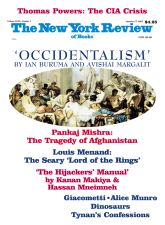To the Editors:
I think John Gregory Dunne intended to say about me in his review of my The Battle of Okinawa: The Blood and the Bomb [NYR, December 20] that I was never in combat. Contrary to his assertion, I did serve in the military, as a naval officer between the Korean and Vietnam wars.
As for his content, my objection is grounded in the dismaying tendency to thump our number one American chests while ignoring other peoples’ greater hardship, heroism, and suffering, a disproportion the September 11 attack upped from huge to often grotesque. Of course Dunne’s praise of my “remarkable” book is gratifying, and I applaud his powerful summary of the description of the fighting on and around Okinawa by me and two authors who took part in it, whose books his reviewed included. Patriotism is indeed easy, and the 99-plus percent who never actually fought can scarcely imagine how hard is war. The Battle of Okinawa in particular—history’s largest involving land, sea, and air forces—was a universe of agony and carnage. Although Iwo Jima became the symbol of the Pacific War’s savagery, more than twice the number of Americans were killed and wounded on Okinawa than on ghastly Iwo and Guadalcanal combined.
For all Dunne’s eloquence and wholly justified tribute to Marine guts, however, I fear his take will help feed the distortion. Okinawa’s brutalizing surpassed Hiroshima’s in every way, including numbers of civilians horribly slaughtered: well over ten times more than American combatants. And if innocence can be quantified, they were even more innocent than Hiroshima’s residents. Profoundly antimilitaristic Okinawans were virtually the opposites of Japanese, with their long infatuation with the martial arts and long history of racial intolerance. They kept no arms whatever for hundreds of years before Japan swallowed them in 1879.
Although libraries of books have been written about the atomic destruction, the far greater Okinawan wastage—cultural, material, and spiritual as well as corporal—remains unknown to almost all Americans. Whereas the Hiroshima tragedy is essentially ended, the Okinawan one will abide as long as much of the historically antimilitarist island continues serving as an immense, foreign military base—for America and Japan, the very countries that devastated the island in 1945. Just because the holocaust of the profoundly pacifist, remarkably peace-loving natives is unknown, the people who suffered proportionately more than any other in World War II continue to suffer as the victims of World War II’s last dirty deal.
Wasn’t that the worst of the “Okinawa Nightmare,” as the cover called it? Isn’t it the most important current issue? But Dunne scarcely mentioned Okinawans. He probably served, however unintentionally, to preserve the nationalistic narrowness with which we view their abused island.
George Feifer
Roxbury, Connecticut
###### John Gregory Dunne replies:
I thought I did make that point. Mr. Feifer’s confusion between what I said and what he thinks I said or wishes I said in no way lessens my admiration for his powerful and unsettling book.
This Issue
January 17, 2002



